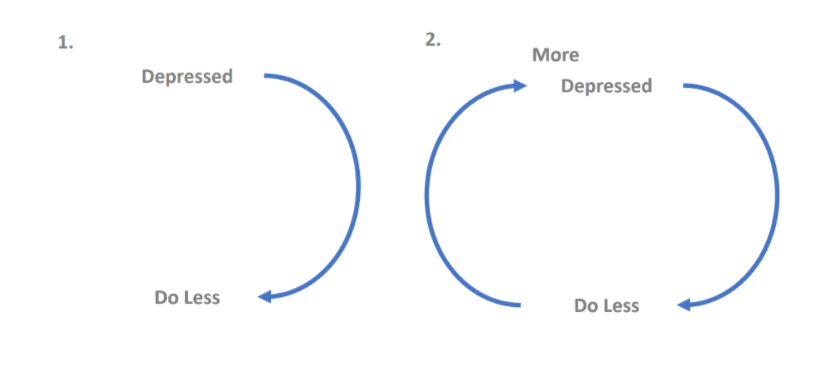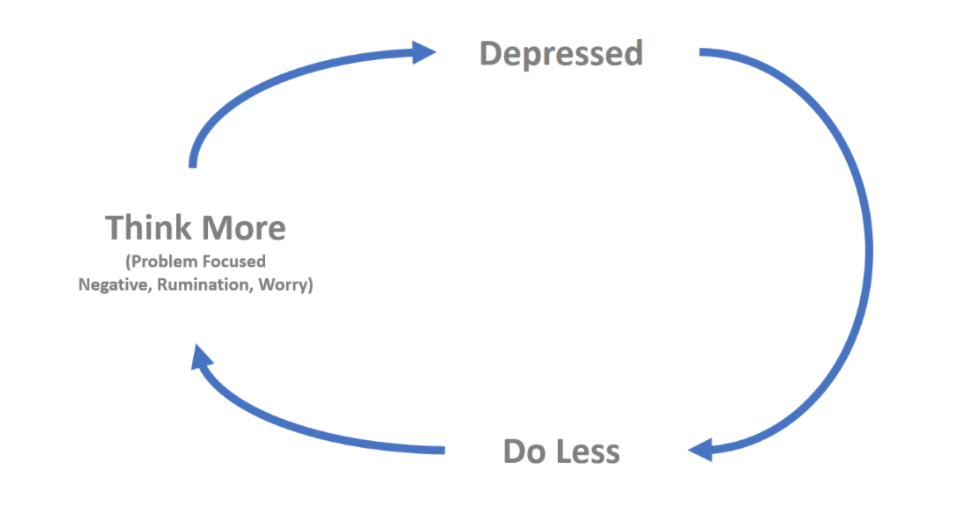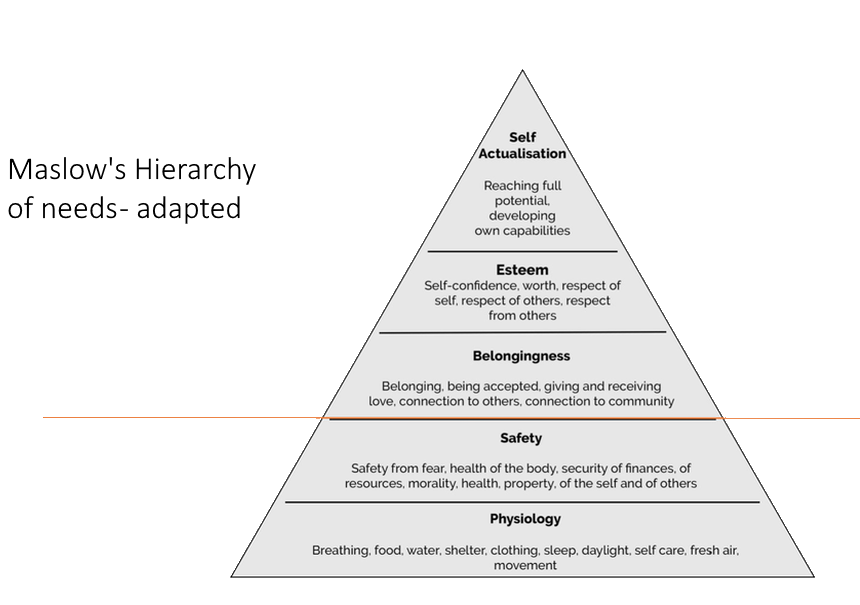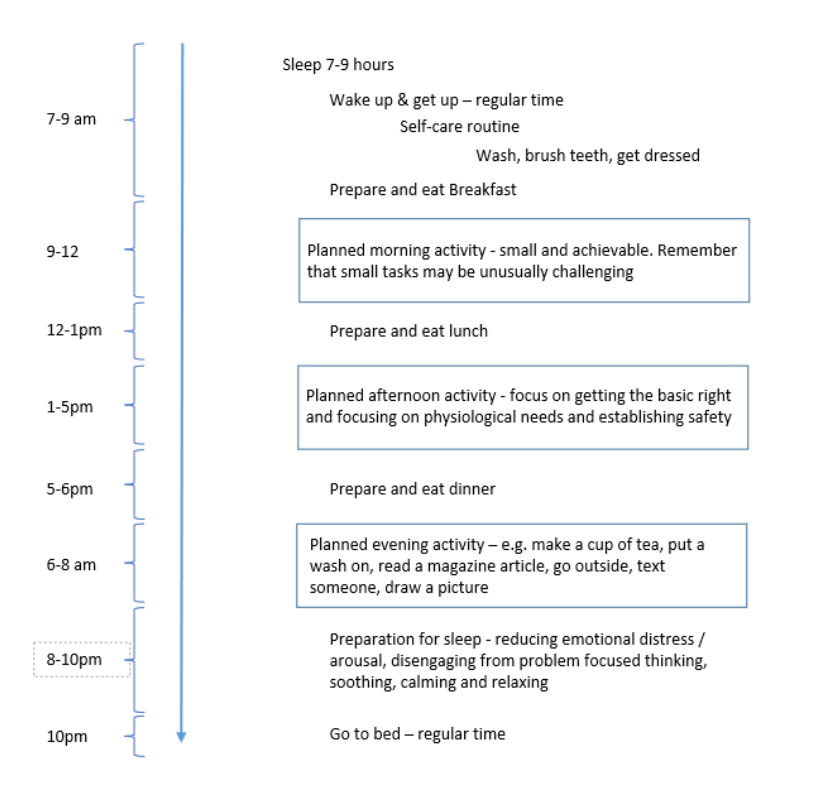Establishing and keeping a good routine
One of the most common responses we see during times of crisis is people withdrawing from usual activities and isolating.
This is a common response to depressed mood because it’s harder to keep doing things we would normally do when we feel low.
When people get depressed, they start to do less (see fig. 1). This is an attempt at self-preservation and can be helpful to a degree. However, withdrawing and isolating for too long, too often or too far makes depressed mood much worse.

When people withdraw and isolate, they create the perfect conditions to think about the difficulties they face. Because the things we think are linked to how we feel our thoughts naturally focus on the sources of sadness and loss. This can in turn increases low mood.

Why do we do this?
At times when we feel up against it, we may need to take time out from other things to help us get through.
This allows us to focus our attention on resolving problems so that we can keep safe, avoid losing something important or come to terms with losses when they happen.
This is a way of preserving and protecting ourselves, allocating our inner resources to deal with important issues and finding understanding and identifying resolutions to problems of importance.
Other stuff loses importance during a crisis. One of the first things we back away from is spending time with others.
One common mistake people make is that they step back too far for too long. It is important therefore to recognise this cycle and put things in place to prevent withdrawal and isolation leading to depressed mood.
Baseline Functioning
When depressed, most people’s level of activity drops below what is required to maintain healthy psychological functioning.
People take to their beds, stop getting up, getting dress, leaving their homes/rooms, eating properly and sleeping well. This makes other more complex task seem impossible.
Establishing and maintaining a good baseline routine is the first stage of recovery from depression following and during a crisis. It also lays the foundations from which we can begin to return to more demanding tasks, and it can protect against depression the future.
Back to basics
If you find yourself withdrawn and isolated and believe this has gone too far, it’s time to begin to do something about it.
‘Maslow’s Hierarchy of Needs’ provides and helpful framework to help us think about this. We have adapted this below to reflect what happens during a crisis and depressed mood.

Crises always affect people at a physiological and safety level. Establishing safety and ensuring we are meeting our physiological needs puts us in the strongest place to get through difficult times. Laying these foundations provides the platform to return to full functioning and apply more behavioural activation. Without these foundations it’s harder to keep connected, to hold our esteem and to fully be ourselves.
A Baseline Routine
Getting up and doing more can feel almost impossible when depressed. However, in order to overcome depression people must reclaim their ability to function, starting with the basics. Maintaining this level of functioning in the event of future difficulties can protect against low mood in the future.
Scheduling activities helps us plan and commit ourselves to doing things despite the pull to isolate and withdraw. Engaging in activity can create a welcome distraction from thinking about problems, ease the intensity of emotions, reconnect us with meaning and purpose and help us to find ourselves.
Below is a basic outline of a minimum routine we should always protect and maintain. The planned activities are not complex but things that feel achievable. Things you would normally be doing routinely but have stopped. Once we have this baseline in place other things become more achievable and we are more likely to maintain the gains.

Notice that the focus here is on our physiological needs and working on good quality sleep, good self-care, feeding and fuelling our system and creating time to do things that keep us moving and connected. We are aiming to build from the base up.
Keep in mind that you are likely to find activities more difficult than usual, so consider achieving anything that is currently difficult a success.
If you’re not enjoying activities or getting a sense of satisfaction this is quite normal. This will return with commitment and perseverance.
Examples of planned activities’ for your schedule:
Go for a walk, do some stretches, light exercise and movement, have a bath, give yourself a massage, eat healthily, drink water, try a relaxation exercise, do some personal grooming, get some daylight
Do some laundry, clean a room, go to the local shop, open letter or emails, stick to your routine, identify something new you could add as an activity, do some DIY, make a cup of tea, do some food shopping
Spend time with a friend / family member, text someone, go out in your local area, be around others without the expectation to participate, arrange to speak with someone online, explore your interests, find a local group or club to join in the future
Cook a meal, play a game, listen to a podcast, listen to some music, go to a park, watch a movie, sing, dance, paint a picture
Tips:
